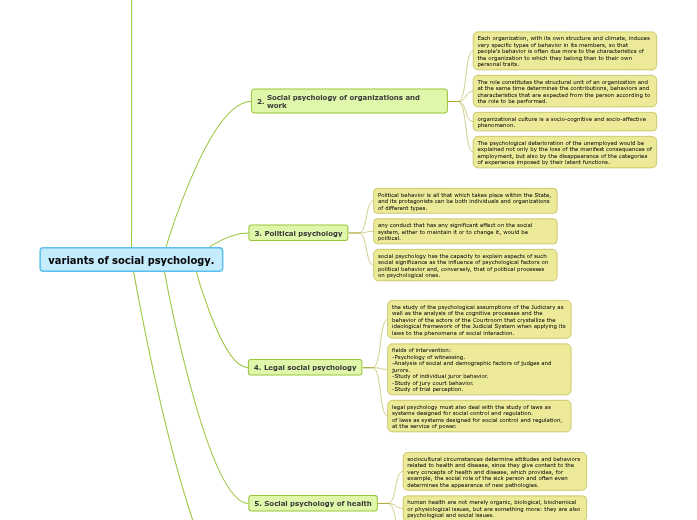variants of social psychology.
social psychology of education
school education is an essential part of socialization and therefore needs to be studied from a psychosocial approach.
educational problems are psychosocial and the contribution of social psychology is absolutely necessary to solve such problems.
interpersonal and group processes interfere in educational processes.
social interaction is a constitutive element of individual and collective subjectivity.
cooperative learning promotes mutual help, friendship and support.
Social psychology of organizations and work
Each organization, with its own structure and climate, induces very specific types of behavior in its members, so that people's behavior is often due more to the characteristics of the organization to which they belong than to their own personal traits.
The role constitutes the structural unit of an organization and at the same time determines the contributions, behaviors and characteristics that are expected from the person according to the role to be performed.
organizational culture is a socio-cognitive and socio-affective phenomenon.
The psychological deterioration of the unemployed would be explained not only by the loss of the manifest consequences of employment, but also by the disappearance of the categories of experience imposed by their latent functions.
Political psychology
Political behavior is all that which takes place within the State, and its protagonists can be both individuals and organizations of different types.
any conduct that has any significant effect on the social system, either to maintain it or to change it, would be political.
social psychology has the capacity to explain aspects of such social significance as the influence of psychological factors on political behavior and, conversely, that of political processes on psychological ones.
Legal social psychology
the study of the psychological assumptions of the Judiciary as well as the analysis of the cognitive processes and the behavior of the actors of the Courtroom that crystallize the ideological framework of the Judicial System when applying its laws to the phenomena of social interaction.
fields of intervention:
-Psychology of witnessing.
-Analysis of social and demographic factors of judges and jurors.
-Study of individual juror behavior.
-Study of jury court behavior.
-Study of trial perception.
legal psychology must also deal with the study of laws as systems designed for social control and regulation.
of laws as systems designed for social control and regulation, at the service of power.
Social psychology of health
sociocultural circumstances determine attitudes and behaviors related to health and disease, since they give content to the very concepts of health and disease, which provides, for example, the social role of the sick person and often even determines the appearance of new pathologies.
human health are not merely organic, biological, biochemical or physiological issues, but are something more: they are also psychological and social issues.
social psychology has contributed to the patient-physician relationship and communication.
Physical environment and social behavior:
environmental psychology and ecology
discipline that studies the relationship between human subjects and their environment. But it not only studies the influence that the environment has on people, but also the influence that people exert on the environment.
Perhaps places are insignificant without the use that people make of them, but it is also true that it is unimaginable to have a social experience completely dissociated from the environmental experience.
The scope of action includes references to a wide range of topics, from the analysis of environmental stressors to the environmental analysis of crimes or environmental attitudes.
